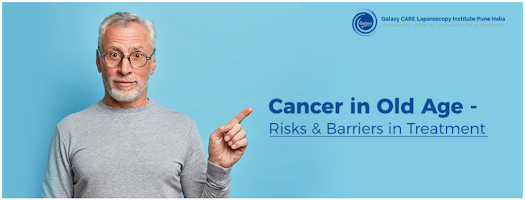CANCER IN OLD AGE – RISKS & BARRIERS IN TREATMENT
Introduction:
As life expectancy increases and medical advancements progress, the global population is witnessing a demographic shift towards an older age structure. With this shift comes a greater prevalence of age-related diseases, including cancer. Cancer, a complex group of diseases characterized by the abnormal growth of cells, presents unique challenges when it manifests in older adults. In this blog, we'll explore the risks and barriers older adults face in cancer treatment and management.
Understanding the Risks:
- Increased Incidence: Age is a significant risk factor for cancer. As individuals age, their cells are more susceptible to genetic mutations that can lead to cancerous growths. Thus, the incidence of cancer rises with age, making it more common among older adults.
- Comorbidities: Older adults often have multiple chronic conditions, such as heart disease, diabetes, or arthritis, which can complicate cancer treatment. Managing these comorbidities alongside cancer adds layers of complexity to the treatment plan and may limit treatment options.
- Decline in Physiological Reserve: Aging is associated with a decline in organ function and physiological reserve. Older adults may have diminished kidney or liver function, which affects their ability to tolerate certain cancer treatments like chemotherapy or radiation therapy.
- Delayed Diagnosis: Symptoms of cancer in older adults can be mistaken for signs of aging or other health conditions. As a result, cancer diagnosis in older adults may be delayed, leading to more advanced disease stages at presentation.
Barriers in Treatment:
- Underrepresentation in Clinical Trials: Older adults are often underrepresented in clinical trials, leading to limited data on the efficacy and safety of cancer treatments in this population. Consequently, oncologists may hesitate to prescribe standard treatments to older adults due to concerns about toxicity or adverse effects.
- Treatment Tolerance and Toxicity: Age-related changes in metabolism and drug clearance can affect how older adults tolerate cancer treatments. They may experience more severe side effects or complications from treatment, leading to dose reductions or treatment interruptions.
- Polypharmacy: Older adults are more likely to be on multiple medications for managing chronic conditions. Drug interactions between cancer treatments and existing medications can occur, necessitating careful monitoring and adjustments to medication regimens.
- Psychosocial Factors: Older adults may face unique psychosocial challenges during cancer treatment, such as social isolation, financial constraints, or caregiver burden. These factors can impact treatment adherence and overall quality of life during cancer treatment.
Addressing the Challenges:
- Comprehensive Geriatric Assessment (CGA): Incorporating a CGA into cancer care for older adults helps assess functional status, comorbidities, cognitive function, and social support. This holistic approach guides treatment decision-making tailored to individual patient needs.
- Geriatric Oncology Programs: Specialized geriatric oncology programs cater to the unique needs of older adults with cancer, providing multidisciplinary care that addresses medical, functional, and psychosocial aspects of aging.
- Shared Decision-Making: Engaging older adults in shared decision-making empowers them to participate actively in their cancer care. Discussing treatment goals, risks, and potential benefits helps align treatment plans with patients' preferences and values.
- Research Inclusion: Efforts to increase the representation of older adults in cancer clinical trials are essential for generating evidence-based treatment recommendations tailored to this population.
Conclusion:
Cancer in old age poses distinct challenges due to physiological changes, comorbidities, and psychosocial factors. Overcoming these barriers requires a multifaceted approach that integrates geriatric principles into cancer care, promotes research inclusion, and prioritizes shared decision-making. By addressing these challenges, healthcare providers can optimize cancer treatment outcomes and improve the quality of life for older adults affected by cancer.



Comments
Post a Comment